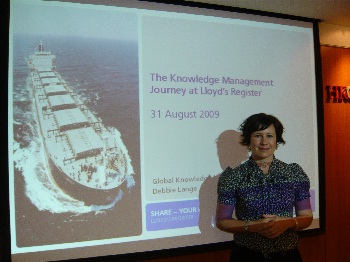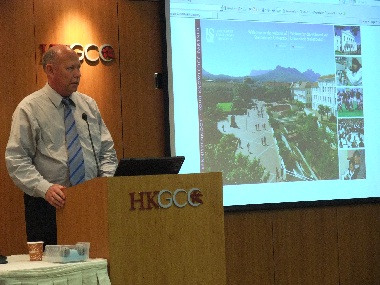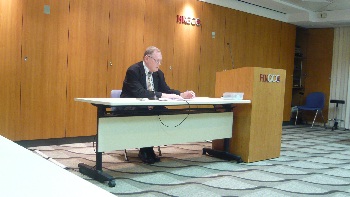Speaker: Debbie Lange, Global Knowledge Manager Marine, Lloyd’s Register
Lloyd’s Register is an independent risk management organisation providing risk assessment and risk mitigation solutions around the world with 240 offices worldwide, served by some 6,000 employees. Lloyd’s Register Marine works around the world to assess and certify ships, systems and facilities to improve quality and increase safety at sea. Lloyd’s Register owes its name to Edward Lloyd’s 17th century coffee house in London, which is also where Lloyd’s of London started.
 Debbie Lange of Lloyd’s Register
Debbie Lange of Lloyd’s Register
Knowledge lies at the heart of the organisation; Edward Lloyd helped his shipping industry clientele to exchange information and knowledge. He also printed the first Register of Ships in 1764, giving underwriters and merchants an idea of the condition of the vessels they insured and chartered. Today the challenge is to leverage over 250 years of corporate memory, in order to realise strategic objectives – captilalising on corporate memory is driving the need to address everyday business issues with knowledge management solutions.
Learning from others is key to the Knowledge Management Programme to ensure the technical edge is retained, duplication is reduced and service to clients is improved to ultimately improve safety at sea. The focus of the Knowledge Management Programme is on integrating practices and renewed processes into day to day activity – globally. In addition to developing a seamless approach to organisational learning in conjunction with the Group Human Resource team.
This presentation focussed on the KM journey in Lloyd’s Register, from strong management support, to investment and implementation of new tools, practices and processes including People Finder and Technical Queries applications, Knowledge Risk Assessments and Sharing Practices associated with Knowledge Retention and Transfer, engagement with the Global Human Resource community and how Lloyd’s Register has branded the KM programme internally.
Debbie joined the London office of Lloyd’s Register in 2006 and now manages the Global Knowledge Management Programme from their Hong Kong office. Debbie has held several Knowledge Management roles over the last 10 years, predominantly in New Zealand where she was Project Manager and then Director of Knowledge Management for New Zealand Trade and Enterprise and Knowledge Manager for Sheffield Human Resource Consulting Ltd.
Debbie is also an executive member of the UK based Knowledge and Innovation Network.
http://www.lr.org


